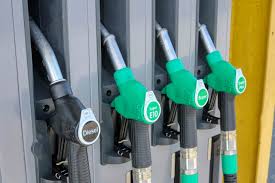
Disclaimer: Copyright infringement not intended.
Context:
- Finance minister Nirmala Sitharaman expressed concern over rising global crude oil prices.
How are Fuel Prices Determined in India?
- Fuel rates are revised everyday at 06:00 AM in India, and this is called dynamic fuel price method.
- This makes sure that variations of global oil prices throughout the day are transmitted and reflected to fuel users and dealers.
India imports 80 percent of crude oil. We process this crude oil in our domestic refineries to generate petroleum products. A large share of our petrol comes via this process. In fact, we barely import any petrol or diesel. This crude oil goes through three stages of the transaction before it comes to your automobiles in the form of petrol and diesel.
Important terms related to Fuel Pricing:
- Oil Refineries: These refineries buy or extract crude like WTI (West Texas Intermediate) Crude, Brent Crude, OPEC Basket crude, etc. and convert these crudes into petrol, diesel, Aviation turbine fuel, Biofuels, etc.
Examples of such refineries are Reliance Industries, Nayara Energy, Bharat Petroleum, Indian Oil, Shell, ONGC, Saudi Aramco, etc.
- OMC (Oil Marketing Companies): These are the companies who market the converted crudes (petrol, diesel, etc.) to dealers and ultimately to users.
Examples of such refineries are Indian Oil, Bharat Petroleum, Shell, Essar, etc.
- Dealers: Dealers are the People who are engaged into business of buying fuels from OMCs and distributing them to users. They are distributors of fuel.
Example: Arvind Patel and Pravin Patel are distributors of cars of Maruti Suzuki Co., they are called dealers of the company and runs the business known as ‘Patel Motors’.
- Users: We are the users of fuel for our vehicles, also the airplane transport companies who buys the aviation turbine fuels from OMCs directly to keep their planes flying through the skies.
How can Government controls Prices of Fuels?
- Central government’s tool to control prices of fuel is Excise Duty.
- State government’s tool to control prices of fuel is VAT.
Who is the official regulator of Fuel prices in India?
- Apart from taxes, Central government regulates the prices of fuels through base prices and cap prices at which dealers and OMCs deal with each other, decided by PPAC (Petroleum Planning and Analysis Cell) under Ministry of Petroleum and Natural Gas.
- Apart from this there are many licenses, regulations, laws applicable to refineries, OMCs, dealers, etc. and after passing through all this processes we get our tank filled with the fuel.
How Retail Price Of Petrol & Diesel Calculated?
- Fuel rates are decided by oil marketing companies. Since they aren't government regulated anymore, it's the responsibility of the oil companies to adjust prices according to global rates.
- However, the state and central governments takes taxes on the retail price of petrol and diesel.
Fuel prices in India are one of the highest taxed in the world. The amount we pay for 1 Liter fuel consists of average 70% taxes.
Why Are Fuel Prices Different In Each State?
- Fuel prices in India also attract higher Value-Added Tax in some states that further increases the price disparity.
- States like Madhya Pradesh and Rajasthan levy higher value-added tax at 33 per cent and 36 per cent respectively. Similarly, the fuel prices in Maharashtra include 26 per cent VAT plus an additional tax of Rs 10.12 per litre.
Read: https://www.iasgyan.in/daily-current-affairs/crude-oil-prices
https://www.financialexpress.com/economy/oil-price-rise-to-hit-economy-looking-at-options-to-mitigate-impact-finance-minister-nirmala-sitharaman/2454519/




